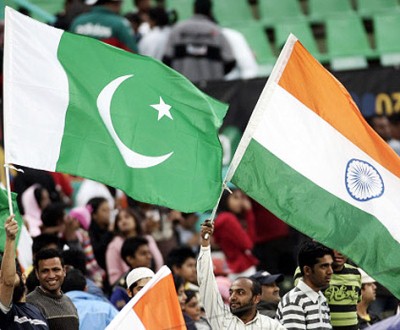Bats, Balls, and Bombs: Cricket and peace in South Asia
Slate |
By PARAG KHANNA & FUAD RANA
Just several hours drive north of the hills where thousands of Pakistani soldiers have surrounded the suspected position of Ayman al-Zawahiri, al-Qaida's "brain," an equally significant event in the struggle for peace and stability in South Asia was taking place. In Peshawar, a free-wheeling frontier town near the Afghan border, Indian and Pakistani pride was on the line in the third of a series of historic cricket test matches, India's first tour across the border in over a decade. Both the capture of Zawahiri and other senior al-Qaida leaders and the successful completion of the cricket series are crucial to putting the peace process in South Asia on track.
With the recent Islamabad summit sparking a wave of positive overtures and symbolic talk of a new era of peace, the test series is considered a sign of India's commitment to engage with Pakistan and of Pakistan's sincerity vis-à-vis its arch-rival. Not since both countries went nuclear in 1998 have tensions and hopes been so high. If the people of India and Pakistan cannot peacefully entertain each other in cricket, what chance do diplomatic solutions have? Peshawar was a particularly significant choice of venue for the affair. The Indian side had never played there before and was reluctant to venture so close to the unstable Afghan border. Indeed, Peshawar is the capital of the Northwest Frontier Province, currently governed by the MMA, a coalition of conservative religious parties. Most famous for being an anti-Soviet espionage hub, Peshawar is today a launching point for raids into the mountainous tribal provinces where Osama Bin Laden and Taliban remnants are suspected to be hiding. As a haven for illegal arms and narcotics traffickers, this region has long been neglected by the central government in Islamabad and holds the potential to spoil Pakistani President Pervez Musharraf's efforts at moderation and development. The Asian media has added even greater pressure to the events by dubbing India's players "diplomatic doubles." Indeed, just as Europeans and Latin Americans take such pride in victories on the soccer field, expressing nationalism through sport, cricket is the great diplomatic leveler of the former British colonies of India and Pakistan, so violently torn apart at birth. It may even yield diplomatic breakthroughs politicians cannot. After the first two record-setting performances in Karachi and Rawalpindi, audiences gave standing ovations to the Indian visitors, especially Sachin Tendulkar, India's greatest batsman, who delighted the crowds with his valiant 141-run stand in the second game. On Thursday evening, President Musharraf hosted a reception for India's players and diplomatic staff, an event filled with shared laughter, compliments, and camaraderie. Musharraf appeared in military uniform, but all the talk was of peace. This weekend, one thousand Indians will walk across the recently re-opened Wagah border to Pakistan to watch the next test match at Qaddafi Stadium in Lahore. There are even rumors that Indian Prime Minister Atal Bihari Vajpayee may attend. The ongoing test series sends an important message to political leaders in the region: Greater exposure to the people on the other side of hostile borders is essential to long-term peace. For the Indians who crossed into Pakistan to watch cricket, the perception of shared culture has become more important than the reality of nuclear confrontation. With enough such exchanges, perception may indeed become reality. Perhaps they will even play a match in the long-disputed province of Kashmir.
